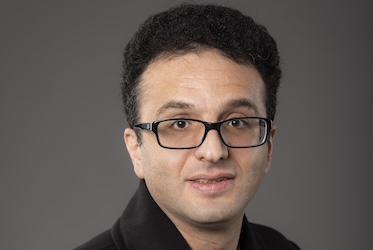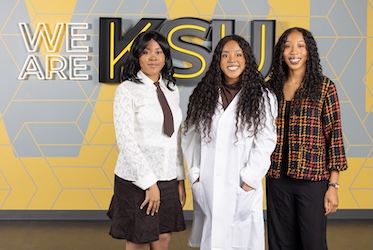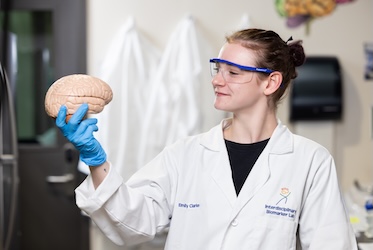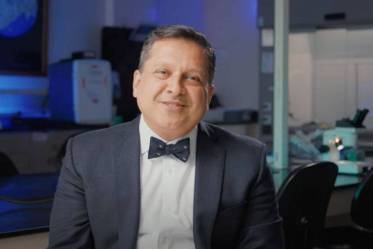
Cellular Research
KENNESAW, Ga. | Oct 22, 2018
Biology student takes research to next level
|
|
|
|---|---|
|
|
|
|
|
Each year, thousands of undergraduates from all over the United States participate in the National Conference on Undergraduate Research (NCUR). NCUR, the largest conference on undergraduate research in the country, features work from some of the nation’s best and the brightest students. Kennesaw State, which will serve as the host institution for NCUR 2019 April 11-13, had almost 100 students present at this year’s conference at the University of Central Oklahoma campus in Edmond. Hope Didier of Peachtree City is one of many KSU students who have presented at NCUR. |
Kennesaw State University junior Hope Didier conducts her research inside the McMurry Lab in the College of Science and Mathematics. Every time she steps inside the lab, she knows there will always be some exciting research to pique her interest.
“My lab focuses on a variety of projects,” said Didier, who is a third-year student with a double major in Molecular and Cellular Biology and Dance. “For example, we’re using cell-penetrating peptides, or CPPs, to deliver molecular cargos into the cell,” she said.
By delivering different molecules into the cells through the use of CPPs, there is great potential for altering environments within living cells for therapeutic and research purposes.
Didier, who is from Peachtree City and an Honors College student, presented her findings at her first NCUR this past spring.
“The only NCUR I have attended was the 2018 NCUR held in Oklahoma, but I do hope that this was just the first of many to come,” she said.

Q: What is your research area?
A: I conduct research in Molecular and Cellular Biology, under the mentorship of Associate Vice President for Research and Professor of Chemistry Jonathan McMurry and Julia LeCher, who is a postdoctoral research associate and part-time assistant professor of cell biology. My lab focuses on a variety of projects. The work I presented at NCUR 2018 involved the delivery of myoglobin to the mitochondria of cells via a novel cell-penetrating peptide that was developed in the lab that I work in. Using cell penetrating peptides or CPPs to deliver molecular cargos into the cell holds great potential for altering environments within living cells for therapeutic and research purposes.
Q: What and/or who has been your inspiration for your research? What interests you the most?
A: When asked who has been my inspiration for my research, I think the person that I want to be in the future is what continues to serve as my inspiration and drives me to do the work that I do. If I keep striving to educate myself and grow and develop my mind I will be able to help others do so in the future. The research process interests me entirely. The fact that we as researchers can sometimes blindly approach a question and with the knowledge that we do have, attempt to answer it, is challenging but so fulfilling once you reach the conclusion and are able to share it with others.
Q: What motivated you to get involved with undergraduate research and NCUR?
A: My mentors, Dr. Jonathan McMurry and Dr. Julia LeCher were the ones that specifically motivated me to present at NCUR; however, it was the connections that I made my freshman year with other students in the President’s Emerging Global Scholar program that jump-started my involvement in undergraduate research.
Q: What have you gained (or hope to gain) from your experience with NCUR?
A: After attending NCUR 2018, I gained an immense amount of humility and pride, as contrasting as that sounds. Humility in the sense that there are so many intelligent young minds all around the country that come together to support one another and support undergraduate research and are excited to share what they have learned, and pride because I am so incredibly proud to be a part of this generation of young scholars.
Q: What advice would you give to others about doing undergraduate research or participating in NCUR?
A: A great deal of the work that I have done as an undergraduate is unheard of at other universities. Kennesaw State University puts a large emphasis on supporting their students in research endeavors. With that said, I would say if presented with the opportunity to conduct undergraduate research, especially here at KSU, embrace it with open arms. Being able to participate in research has been a highlight of my time at KSU and although it can be challenging and difficult to juggle when combined with a full class schedule, it is such an honor.
– Robert S. Godlewski
Photos by David Caselli
Related Stories

Kennesaw State physics professor receives Department of Energy grant to explore light-matter interactions in quantum materials

Triplets each find their own path to success at Kennesaw State

Research helps dual major forge path at Kennesaw State

Kennesaw State alum receives international scientific honor
A leader in innovative teaching and learning, Kennesaw State University offers undergraduate, graduate, and doctoral degrees to its more than 47,000 students. Kennesaw State is a member of the University System of Georgia with 11 academic colleges. The university’s vibrant campus culture, diverse population, strong global ties, and entrepreneurial spirit draw students from throughout the country and the world. Kennesaw State is a Carnegie-designated doctoral research institution (R2), placing it among an elite group of only 8 percent of U.S. colleges and universities with an R1 or R2 status. For more information, visit kennesaw.edu.















